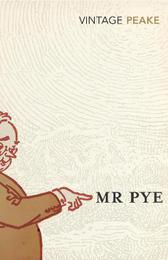
|
Mr Pye
Paperback / softback
Main Details
| Title |
Mr Pye
|
| Authors and Contributors |
By (author) Mervyn Peake
|
| Physical Properties |
| Format:Paperback / softback | | Pages:256 | | Dimensions(mm): Height 198,Width 129 |
|
| Category/Genre | Modern and contemporary fiction (post c 1945) |
|---|
| ISBN/Barcode |
9780099283263
|
| Classifications | Dewey:823.912 |
|---|
| Audience | |
|---|
|
Publishing Details |
| Publisher |
Vintage Publishing
|
| Imprint |
Vintage Classics
|
| Publication Date |
2 December 1999 |
| Publication Country |
United Kingdom
|
Description
Brimming with good cheer, Mr Pye decides to bring peace and love to Sark's 289 eccentric inhabitants. This is a charming fable about the battle bewteen good and evil. Equipped with love, Mr Harold Pye lands on the island of Sark, his mission to convert the islanders into a crusading force for the undiluted goodness that he feels within. The extraordinary inhabitants of the island range from the formidable Miss George in her purple busby to the wanton, raven-haired Tintagieu, 'five foot three inches of sex'. Mr Pye, however, is prone to excess and in the increasingly personalised struggle between good and evil, excess is very nearly his downfall.
Author Biography
Mervyn Peake was born in 1911. He is perhaps most famous for the 'Gormenghast' trilogy which were published between 1946 and 1959 - Titus Groan, Gormenghast and Titus Alone. He has also written a book for children, Captain Slaughterboard Drops Anchor and several volumes of poetry. He was also a gifted book illustrator. He died in 1968.
ReviewsThe novel gives a clear sense of Sark as somewhere both remarkable and beautiful. * The Guardian * I am delighted to meet you,' trills Mr Pye to a fisherman. 'Are you, eh, you fat little porker,' the thug replies. 'B- you. * - * Peake has been praised, but he has also been mistrusted," observed Anthony Burgess in his introduction to Titus Groan . "His prose works are not easily classifiable: they are unique as, say, the books of Peacock or Lovecraft are unique . . . It is difficult, in postwar English writing, to get away with big rhetorical gestures. Peake manages it because, with him, grandiloquence never means diffuseness; there is no musical emptiness in the most romantic of his descriptions; he is always exact. * Anthony Burgess * The fable is cleverly and gracefully resolved and the final scenes are a joy to read. Peake's illustrations complement the novel very well and these, too, are examples of his charm, of his enormous illustrative range. * Washington Post *
|